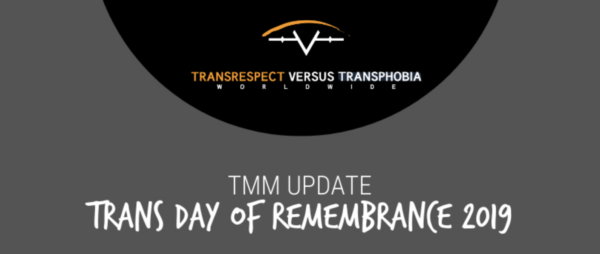News
Report ahead of Trans Day of Remembrance shows 331 trans murders in last year


Last week, in advance of today’s International Trans Day of Remembrance, Transrespect versus Transphobia Worldwide released the annual results from its Trans Murder Monitoring research project, “to join the voices raising awareness of this day regarding hate crimes against trans and gender-diverse people, and to honour the lives of those who might otherwise be forgotten.”
The TMM project is devoted to the systematic collection, monitoring and analysis of reported killings of gender-diverse/trans people worldwide. It was established by TvT Worldwide in 2009, using data from 2008 onward.
This year’s update, which was published on the organization’s website November 11, reported 331 cases of reported killings of trans and gender-diverse people between October 1 2018 – September 30 2019.
The complete update is reproduced below:
“On the occasion of the International Trans Day of Remembrance (TDoR), which is held on 20th of November 2019, the Transrespect versus Transphobia Worldwide (TvT) team is publishing the Trans Murder Monitoring (TMM) research project update to join the voices raising awareness of this day regarding hate crimes against trans and gender-diverse people, and to honour the lives of those who might otherwise be forgotten.
The TDoR 2019 update has revealed a total of 331 cases of reported killings of trans and gender-diverse people between 1 October 2018 and 30 September 2019. The majority of the murders occurred in Brazil (130), Mexico (63), and the United States (30), adding up to a total of 3314 reported cases in 74 countries worldwide between 1st of January 2008 and 30th of September 2019.
Stigma and discrimination against trans and gender-diverse people is real and profound around the world, and are part of a structural and ongoing circle of oppression that keeps us deprived of our basic rights. Trans and gender-diverse people are victims of horrifying hate violence, including extortion, physical and sexual assaults, and murder. In most countries, data on murdered trans and gender-diverse people are not systematically produced and it is impossible to estimate the actual number of cases.
Violence against trans and gender-diverse people frequently overlaps with other axes of oppression prevalent in society, such as racism, sexism, xenophobia, and anti-sex worker sentiment and discrimination. TMM data shows that the victims whose occupations are known are mostly sex workers (61%). In the United States, the majority of the trans people reported murdered are trans women of colour and/or Native American trans women (85%), and in France, Italy, Portugal, and Spain, which are the countries to which most trans and gender-diverse people from Africa and Central and South America migrate, 65% of the reported murder victims were migrant trans women.
More about the project can be found on our TMM report 2016.”
Since beginning the TMM project, TvT has registered the murders of 3317 trans and gender-diverse people worldwide. The killings are merely catalogued as reports of murdered trans and gender-diverse persons, without further classification, because (according to the TvT website), “The classification of the murder of a trans/gender-diverse person as a hate crime is often difficult, due to a lack of information in the reports as well as the lack of national monitoring systems.”
TvT Worldwide, an ongoing, comparative qualitative-quantitative research project initiated by Transgender Europe (TGEU), serves gender-diverse/trans people’s movements and activism by seeking to provide an overview of the human-rights situation of trans and gender-diverse persons in different parts of the world and to develop useful data and advocacy tools for international institutions, human-rights organizations, the trans movement, and the general public. Besides the TMM, their work is divided into two additional sub-projects: one, dedicated to legal and social mapping, surveys existing laws, law proposals, and actual legal and health-care practices as well as diverse aspects of the social situation relevant to gender-diverse/trans people; another, a Survey on the Social Experiences of Trans and Gender-Diverse People, addresses experiences of both Transphobia and Transrespect in communities around the world.
You can read more about the TMM and TvT Worldwide’s other work here.

Texas state Rep. James Talarico won a hard-fought primary Tuesday to become the state’s Democratic nominee for U.S. Senate, defeating U.S. Rep. Jasmine Crockett in one of the year’s most closely watched and competitive Democratic contests.
Talarico, a Presbyterian seminarian and three-term lawmaker from Round Rock, was declared the winner by the Associated Press early Wednesday morning after a closely tracked vote count that drew national attention.
“Tonight, the people of our state gave this country a little bit of hope,” Talarico told the AP. “And a little bit of hope is a dangerous thing.”
With 52.8% of the vote to Crockett’s 45.9%, Talarico secured the nomination outright, avoiding a runoff and capping months of sharp contrasts between the two candidates over strategy, messaging, and how best to compete statewide in Texas. Democrats hope the competitive primary — and the relatively narrow margin — signals growing momentum in a state that has not elected a Democrat to the U.S. Senate since 1988.
Talarico has long expressed support for the LGBTQ community, a position he highlights prominently on his campaign website. Under the “Issues” section, he directly addresses assumptions that might arise from his faith and background as a seminarian in a deeply conservative state.
“My faith in Jesus leads me to reject Christian Nationalism and commit myself to the project of democracy,” his website reads. “Because that’s the promise of America: a democracy where every person and every family — regardless of religion, race, gender, sexual orientation, or any other difference between us — can truly be free and live up to their full potential.”
Crockett struck a conciliatory tone following her defeat, emphasizing party unity ahead of November.
“This morning I called James and congratulated him on becoming the Senate nominee,” Crockett told Politico. “Texas is primed to turn blue and we must remain united because this is bigger than any one person. This is about the future of all 30 million Texans and getting America back on track.”
Talarico also drew national attention earlier in the race when “Late Show” host Stephen Colbert said he was initially unable to air an interview with the state legislator due to potential FCC concerns involving CBS. The episode sparked a broader political debate.
Brendan Carr, chair of the Federal Communications Commission, appointed by President Donald Trump, told reporters the controversy was a “hoax,” though he also acknowledged Talarico’s ability to harness the moment to build support as an underdog candidate. The interview was later released online and garnered millions of views, boosting Talarico’s national profile.
In November, Talarico will face the winner of the Republican primary between incumbent Sen. John Cornyn and Texas Attorney General Ken Paxton, who have been locked in a bruising GOP contest. Rep. Wesley Hunt was also in the Republican primary field. The GOP race is expected to head to a May runoff.
In a joint statement, Senate Minority Leader Chuck Schumer and Democratic Senatorial Campaign Committee Chair Kirsten Gillibrand praised Talarico’s victory and framed him as a candidate capable of broad appeal.
“As an eighth-generation Texan, former middle school teacher, and Presbyterian seminarian, James will be a fighter for Texans from all walks of life and of all political stripes,” they said. “In November, Texans will elect a champion for working people: James Talarico.”
Maryland
Md. Commission on LGBTQIA+ Affairs released updated student recommendations
LGBTQ students report higher rates of bullying, suicide

The Maryland Commission on LGBTQIA+ Affairs has released updated recommendations on how the state’s schools can support LGBTQ students.
The updated 16-page document outlines eight “actionable recommendations” for Maryland schools, supplemented with data and links to additional resources. The recommendations are:
- Developing and passing a uniform statewide and comprehensive policy aimed at protecting “transgender, nonbinary, and gender expansive students” against discrimination. The recommendation lists minimum requirements for the policy to address: name, pronoun usage, and restroom access.
- Requiring all educators to receive training about the specific needs of LGBTQ students, by trained facilitators. The training’s “core competencies” include instruction on terminology, data, and support for students.
- Implementing LGBTQ-inclusive curricula and preventing book bans. The report highlights a “comprehensive sexual education curriculum” as specifically important in the overall education curriculum. It also states the curriculum will “provide all students with life-saving information about how to protect themselves and others in sexual and romantic situations.”
- Establishing Gender Sexuality Alliances “at all schools and in all grade levels.” This recommendation includes measures on how to adequately establish effective GSAs, such as campaign advertising, and official state resources that outline how to establish and maintain a GSA.
- Providing resources to students’ family members and supporters. This recommendation proposes partnering with local education agencies to provide “culturally responsive, LGBTQIA+ affirming family engagement initiatives.”
- Collecting statewide data on LGBTQ youth. The data on Maryland’s LGBTQ youth population is sparse and non-exhaustive, and this recommendation seeks to collect information to inform policy and programming across the state for LGBTQ youth.
- Hiring a full-time team at the Maryland Department of Education that focuses on LGBTQ student achievement. These employees would have specific duties that include “advising on local and state, and federal policy” as well as developing the LGBTQ curriculum, and organizing the data and family resources.
- Promoting and ensuring awareness of the 2024 guidelines to support LGBTQ students.
The commission has 21 members, with elections every year, and open volunteer positions. It was created in 2021 and amended in 2023 to add more members.
The Governor’s Office of Communication says the commission’s goal is “to serve LGBTQIA+ Marylanders by galvanizing community voices, researching and addressing challenges, and advocating for policies to advance equity and inclusion.”
The commission is tasked with coming up with yearly recommendations. This year’s aim “to ensure that every child can learn in a safe, inclusive, and supportive environment.”
The Human Rights Campaign’s most recent report on LGBTQ youth revealed that 46.1 percent of LGBTQ youth felt unsafe in some school settings. Those numbers are higher for transgender students, with 54.9 percent of them saying they feel unsafe in school.
Maryland’s High School Youth Risk Behavior Survey reveals a disparity in mental health issues and concerns among students who identify as LGBTQ, compared to those who are heterosexual. LGBTQ students report higher rates of bullying, feelings of hopelessness, and suicidal thoughts. Nearly 36 percent of LGBTQ students report they have a suicide plan, and 26.7 percent of respondents say they have attempted to die by suicide.
The commission’s recommendations seek to combat the mental health crisis among the state’s LGBTQ students. They are also a call for local and state governments to work towards implementing them.
Virginia
Va. lawmakers consider partial restoration of Ryan White funds
State Department of Health in 2025 cut $20 million from Part B program

The Virginia General Assembly is considering the partial restoration of HIV funding that the state’s Department of Health cut last year.
The Department of Health in 2025 cut $20 million — or 67 percent of total funding — from the Ryan White Part B program.
The funding cuts started with the Trump-Vance administration passing budget cuts to federal HIV screening and protection programs. Rebate issues between the Virginia Department of Health and the company that provides HIV medications began.
Advocates say the funding cuts have disproportionately impacted lower-income people.
The Ryan White HIV/AIDS Program, a federal program started in 1990, provides medical services, public education, and essential services. Part B offers 21 services, seven of which remained funded after the budget cuts.
Equality Virginia notes “in 2025, a 67 percent reduction severely destabilized HIV services across the commonwealth.”
Virginia lawmakers have approved two bills — House Bill 30 and Senate Bill 30 — that would partially restore the funding. The Ryan White cuts remain a concern among community members.
Both chambers of the General Assembly must review their proposed changes before lawmakers can adopt the bills.
“While these amendments aren’t a full restoration of what community-based organizations lost, this marks a critical step toward stabilizing care for thousands of Virginians living with HIV,” said Equality Virginia Executive Director Narissa Rahaman. “Equality Virginia plans to continue their contact with lawmakers and delegates through the conference and up until the passing of the budget.”
“We appreciate lawmakers from both sides of the aisle who recognized the urgency of this moment and will work to ensure funding remains in the final version signed by the governor,” added Rahaman.




















